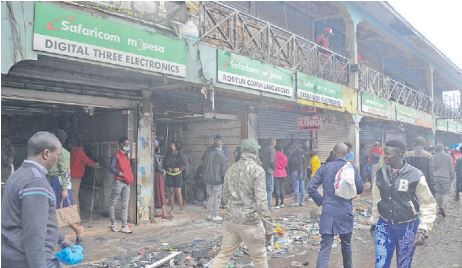

A section of shops that were vandalised during the Gen Z demonstrations in Nairobi CBD, on June 26 /Handout
June 25 was intended to be a solemn day of national remembrance for the young people who lost their lives during last year’s tax protests.
Thousands of Gen Z youth gathered across more than 28 counties – carrying flowers, candles and portraits—not in defiance but in peaceful mourning.
The day started with calm dignity, with prayers and poetry echoing the constitutional right under Article 37 to assemble and express grievances peacefully.
However, as dusk fell, this peaceful atmosphere was disrupted. In multiple locations, unidentified masked individuals interrupted the commemorations, turning moments of reflection into scenes of chaos.
In areas like Kikuyu and Nairobi’s central business district, coordinated groups arrived with jerricans, setting public infrastructure on fire, looting businesses and attacking police stations.
A total of nine police stations were targeted, five burned down and 170 vehicles destroyed. Fertiliser worth Sh29.5 million also went missing.
These events indicated not spontaneous unrest but premeditated acts, raising questions about who organised the violence and for what purpose.
Small businesses—many owned by young people—bore the brunt of the destruction. Salons, cafés, market stalls and cyber shops were looted or set on fire, leaving some with nothing.
For many, the day ended with double sorrow: mourning the dead and lost livelihoods. Amid the destruction, police officers also sustained injuries, but there were also powerful moments of compassion, like peaceful protesters shielding and helping an injured female officer in Nairobi’s CBD.
A major controversy arose when the Communications Authority of Kenya ordered the suspension of live media coverage during the demonstrations.
Many viewed this as an infringement on the right to real-time information. The Law Society of Kenya successfully challenged the directive, and the High Court lifted the ban, reaffirming constitutional protections around transparency and access to information.
Speaking at the World MSME Day event on June 27, President William Ruto weighed in, condemning the unrest and framing it as an attempt at unconstitutional regime change.
He characterised the violence as “economic sabotage,” suggesting that criminal groups had used the protests to destabilise the nation. His comments highlighted the government's concern over the exploitation of legitimate civic events by organised gangs.
Subsequently, the Directorate of Criminal Investigations began probing the unrest, focusing on identifying individuals and networks responsible for the coordinated attacks.
Preliminary findings point to criminal gangs that infiltrated the demonstrations. Recognising this distinction is critical—to separate those who genuinely mourned from those who exploited the occasion for violence.
The events of June 25 underline a difficult balancing act for Kenya: protecting the sacred constitutional right to peaceful protest while safeguarding such spaces from criminal manipulation.
This responsibility is collective. Government agencies, civil society, protest organisers and communities must work in concert to ensure civic actions are not derailed.
Three key lessons emerge. First, justice must be fair and targeted—those responsible for destruction must be held accountable through due legal process, without lumping peaceful mourners with perpetrators.
Second, civil society and organisers must improve internal coordination to quickly identify and isolate violent actors. Third, the public must avoid simplistic narratives; most who participated on June 25 came with peaceful intent, not to incite.
Sadly, 19 Kenyans lost their lives on a day meant to honour those already gone. Their deaths demand a response rooted in truth and justice.
These were not nameless statistics—they were loved ones whose memory must be preserved through national empathy and institutional accountability.
Ultimately, June 25 taught the country a powerful lesson: in a democracy, grief is not a disruption—it is a vital part of civic engagement.
Peaceful public expression, even in mourning, is protected under the Constitution and must be respected. Moving forward, it is incumbent on all—government, civil society and citizens alike—to preserve the sanctity of democratic space, uplift peaceful voices and transform pain into reform.
In doing so, Kenya honours both the fallen and the living, refusing to let silence or criminality rewrite the story of its youth.
Okango is a strategic adviser in communication and an expert in leadership and governance.












